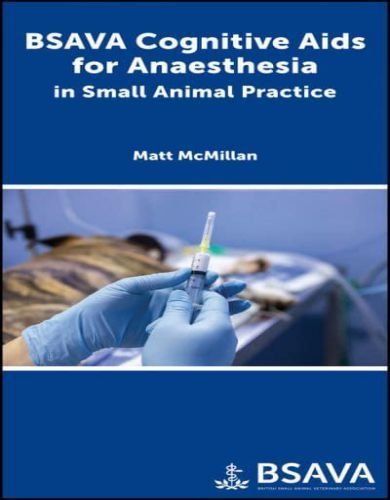Cognitive Aids for Anaesthesia in Small Animal Practice
by

The Cognitive Aids for Anaesthesia in Small Animal Practice is a quick reference resource for veterinary teams in theatre. It includes checklists that should be completed as part of any anaesthetic procedure as well as troubleshooting guides and crisis checklists. Areas covered include:
- Equipment and drugs lists
- Pre-anaesthetic assessment lists and forms
- Intraoperative safety checklists
- Crisis checklists (e.g. hyperthermia, hypotension, haemorrhage)
- Troubleshooting guides for capnography waveforms, pulse waveforms and pulse oximetry
The primary aim for anyone working in veterinary medicine is to provide effective healthcare whilst minimizing harm to the patient. Progress has been made over recent years in terms of improved monitoring and pharmaceuticals, but the very real potential of anaesthesia causing harm remains. Anaesthesia, although considered routine by many, is a complex process involving a multitude of tasks that need to be performed in the correct way, in the correct order, at the correct time often in rapid succession. If any task in the process is missed or performed inappropriately the risk of harm to the patient increases. As such, anaesthesia lends itself to the application of cognitive aids. Canine and Feline Anaesthesia and Analgesia 3rd Edition
Cognitive aids are visual prompts or decision guides, such as checklists or algorithms, which aim to reduce human error in critical processes by providing a supportive scaffolding that ensures tasks are performed and communicated appropriately. Unlike protocols or standard operating procedures, cognitive aids can be applied while a task is being performed.
This reduces reliance on memory alone to perform tasks safely and effectively, and allows individuals to concentrate on other cognitive tasks, such as problem-solving and decision-making, while reducing the risk of cognitive overload, forgetfulness, distraction, fatigue or stress compromising the success of the task. They are particularly useful for critical steps that may not be readily recalled in high-pressure situations.
Direct Link For Paid Membership: –
| Book Name: | Cognitive Aids for Anaesthesia in Small Animal Practice | |
| File Size: | 1 MB | |
| File Format: | ||
| Download Link: | Click Here | |
| Password: | PDFLibrary.Net (if Required) | |






